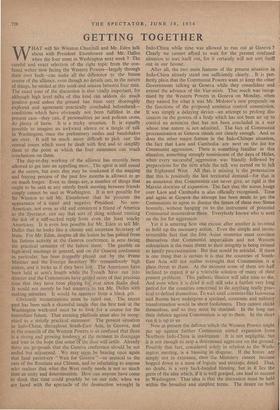GETTING TOGETHER
Indo-China while time was allowed to run out at Geneva ? Clearly we cannot afford to wait for the present confused situation to sort itself out, for it certainly will not sort, itself out in our favour.
After all, the two main features of the present situation in Indo-China already stand out sufficiently clearly. , It is per- fectly plain that the Communist Powers want to keep the other Governments talking at Geneva while they consolidate and extend the advance of the Viet-minh. That much was recog- nised by the Western Powers in Geneva on Monday, when they named for what it was Mr. Molotov's new proposals on the functions of the proposed armistice control commission. It was simply a delaying device—an attempt to prolong dis• cussion on the powers of a body which has not been set up to control an armistice that has not been concluded in a war whose true nature is not admitted. The fact of Communist procrastination at Geneva stands out clearly enough. And so does the other major feature in the Indo-Chinese situation, the fact that Laoi and Cambodia are next on the list for Communist aggression. There is something familiar in this situation, something strongly reminiscent of the days of Hitler, when every successful , aggression was blandly followed by preparations for the next while the talk was turned on to lull the frightened West. All that- is missing is the protestation that this is positively the last territorial demand—for that is an assurance that Communists can never give, so rigid is the Marxist doctrine of expansion. The fact that the noose hangs over Laos and Cambodia is also officially recognised. Time and again at Geneva the attempt has been made to get the Communists to agree to discuss. the future of these two States honestly, without hanging on to the instrument of potential Communist insurrection there. Everybody knows who is next on the list for aggression.
Yet it is amazing how one excuse after another is invented to hold up the necessary action. Even the simple and incon- trovertible fact that the free Asian countries must convince themselves that Communist imperialism and not Western colonialism is the main threat to their integrity is being twisted to justify procrastination. But that would be suicidal. If there is one thing that is certain it is that the countries of South- East Asia will hot realise overnight that Communism is a plain threat to them. At the moment some of them are half inclined to regard it as a tolerable solution of many of their present problems. This pathetic 'illusion will take time to die. And even when it is dead it will still take a further very long period for the countries concerned to do anything really prac- tical to defend themselves. To wait until countries like Indonesia and Burma have undergone a spiritual, economic and military transformation would be sheer foolishness. They cannot shield themselves, and so they must be shielded. In the long run their defence against Communism is up to them. In the short run it is up to us sides to maintain and strengthen the Alliance may be taken for granted. The need to avoid entanglement in a mass of unsettled detail should be equally clear. If the official assur- ance that this is not an emergency meeting could be un- reservedly accepted, then it would be clear already. Let us assume that it can be accepted. Then the task for Washington is plain. The Communists are advancing in Indo-China. The French need stiffening if they are to resist at all. The other countries of South-East Asia are neither able nor unreservedly willing to defend themselves. We must therefore prepare to increase our forces in the area as quickly as possible, and with as much support from the threatened countries as we can get. The downward trend in the American armed forces must be reversed. The British armed forces must be increased and rearranged. The crude outline encloses a multitude of hard and unpleasant details. But even the crude outline is not clear yet in terms of official British and American policy. It could be made clear in Washington next week.



















































 Previous page
Previous page